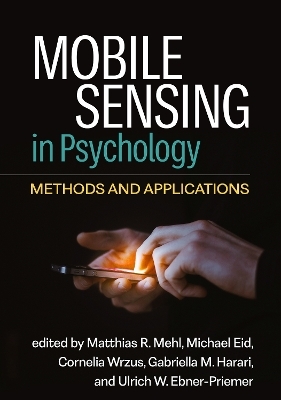
Mobile Sensing in Psychology
Guilford Press (Verlag)
978-1-4625-5310-5 (ISBN)
Matthias R. Mehl, PhD, is Professor of Psychology at the University of Arizona. He is a social and personality psychologist interested in the conceptualization and measurement of how everyday social processes affect health and well-being. He employs mobile sensing methods for studying real-world social interactions and has pioneered a method that involves the unobtrusive sampling of ambient sounds via a smartphone app (the Electronically Activated Recorder, or EAR). Dr. Mehl has published extensively and given workshops on mobile sensing and other real-world psychological research methods. He is a Fellow of the Association for Psychological Science and the Society for Personality and Social Psychology. Michael Eid, PhD, is Professor of Methods and Evaluation at the Free University of Berlin in Germany. His research focuses on measurement theory, in particular, the development of psychometric models for longitudinal and multimethod research. His more applied research contributions are in the area of subjective well-being, mood regulation, and health psychology. With respect to mobile sensing, Dr. Eid is especially interested in the psychometric foundation of multimethod mobile sensing research strategies and the modeling of intensive longitudinal data. Widely published, he has served as editor of several journals in the area of methodology and assessment. Cornelia Wrzus, PhD, is Professor of Psychological Aging Research at the Ruprecht-Karls University of Heidelberg, Germany, where she founded the Daily Life Lab. Her research focuses on socioemotional and personality development across the entire adult lifespan. Dr. Wrzus has published many articles on personality development, emotional processes, and social dynamics in daily life, using experience sampling, ambulatory physiological assessments, and mobile sensing. One particular concern is the integration of both open science standards and privacy protection in ambulatory assessment research of people’s daily lives. She has served on the editorial boards of several personality journals and is president-elect of the Society for Ambulatory Assessment. Gabriella M. Harari, PhD, is Assistant Professor in the Department of Communication at Stanford University, where she directs the Media and Personality Lab. Her research focuses on everyday behavior and its relationship to personality and well-being. She takes an ecological approach to conducting her research, emphasizing the importance of studying people in their natural physical and digital contexts. Over the last decade, Dr. Harari has published extensively on mobile sensing and given workshops about using the method for studying daily life. Ulrich W. Ebner-Priemer, PhD, is Professor of Psychology and Chair of the Mental mHealth (mobile health) Lab at the Karlsruhe Institute of Technology in Germany. His work is characterized by its methodological focus on ambulatory assessment, investigating phenomena of interest in everyday life and real time. He is particularly interested in a multimodal operationalization of phenomena of interest, combining e-diaries with wearables, and digital phenotypes; real-time analyses and real-time feedback; and analysis of dynamic processes. Dr. Ebner-Priemer provides the technological mHealth framework for studies on a broad range of mental disorders. He is former president of the Society for Ambulatory Assessment and current Chair of the ECNP Digital Health Network.
I. Mobile Sensing: Background and Key Concepts
1. How to Conduct Mobile Sensing Research, Gabriella M. Harari, Serena Soh, & Lara Kroencke
2. Designing for Privacy in Mobile Sensing Systems, Jason I. Hong
3. Transparency and Reproducibility in Mobile Sensing Research, Cornelia Wrzus & Ramona Schoedel
II. Mobile Sensors: Technological Know-How and Methodological How-To
4. Acquisition and Analysis of Location Data, Sven Lautenbach, Sarah Lohr, & Markus Reichert
5. Acquisition and Analysis of Physical Behavior Data, Marco Giurgiu & J. B. J. (Hans) Bussmann
6. Acquisition and Analysis of Ambulatory Autonomic Nervous System Data, Eco J. C. de Geus & Martin J. Gevonden
7. Analysis of Phone Logs and Phone Usage Patterns, Sandrine R. Müller, Aaron Cohen, Marcel Enge, & John F. Rauthmann
8. Mobile Application Usage in Psychological Research, Larissa Sust, Sanaz Talaifar, & Clemens Stachl
9. Examining Well-Being in Situated Contexts with Computational Modeling of Social Media Data, Koustuv Saha & Munmun De Choudhury
10. Behavioral Audio Signal Processing in Mobile Sensing Research, Rajat Hebbar, Arindam Jati, Tiantian Feng, Ramon Reyes, Alexander F. Danvers, Matthias R. Mehl, & Shrikanth S. Narayanan
11. Acquisition and Analysis of Camera Sensor Data (Life Logging), Edison Thomaz & Mariella Dimiccoli
12. Beyond the Smartphone: The Future of Wearables as Mobile Sensors, Kristof Van Laerhoven
13. Viva Experience Sampling: Combining Passive Mobile Sensing with Active Momentary Assessments, Ulrich Ebner-Priemer & Philip Santangelo
III. Analysis of Mobile Sensing Data
14. A Psychometric Perspective on Mobile Sensing Data, Michael Eid & Jana Holtmann
15. Dynamic Structural Equation Modeling for the Analysis of Mobile Sensing Data, Jana Holtmann, Michael Eid, & Martina Kanning
16. Dynamic Network Analysis, Emorie D. Beck & Stuti Thapa
17. Machine Learning for Mobile Sensing Data, Andreas M. Brandmaier
18. Deep Learning Methods for Mobile Sensing, Cara J. Arizmendi, Christopher J. Urban, Kathleen M. Gates
19. Big Data Dimensionality Reduction Methods, Andreas M. Brandmaier
IV. Mobile Sensing Applications in Psychological Science
20. Mobile Sensing in Personality Science, Felix Beierle, Sandra C. Matz, & Mathias Allemand
21. Mobile Sensing Applications in Moral Psychology, Farzan Karimi-Malekabadi, Mohammad Atari, & Morteza Dehghani
22. Mobile Sensing in Relationship Research, Andrea B. Horn & Adela C. Timmons
23. Wearable Technologies in the Workplace: Sensing to Create Responsive Industrial and Occupational Environments Optimized for Health, Jacob N. Hyde, Johnny R. Runyon, Altaf Engineer, Beth Kramer, Casey M. Lindberg, & Esther M. Sternberg
24. Emotion Detection with Mobile Sensing, Koen Niemeijer & Peter Kuppens
25. Cognition on the Go: Opportunities and Challenges for Mobile Cognitive Health Research, Martin Sliwinski, Nelson Roque, & Karra Harrington
26. Mobile Sensing in Developmental Science: A Practical Guide for Researchers, Kaya de Barbaro & Caitlin M. Fausey
27. Mobile Sensing in Aging Research, Birthe Macdonald, Melanie Becker, Mike Martin, & Christina Röcke
28. mHealth Interventions for Health Behaviors, Christine Vinci, Brian Gonzalez, Darla Kendzor, Michael Businelle, & Santosh Kumar
29. Sensing in Clinical Psychology, Geneva K. Jonathan & Dror Ben-Zeev
30. Smart Interventions, Inbal Nahum-Shani
31. Behavior Change, Jean Costa, Pablo Paredes, & Tanzeem Choudhury
32. Mobile Sensing in Neuroscience: Predicting Brain Functional Connectivity Using Smartphone Data, Mikio Obuchi, Jeremy Huckins, Weichen Wang, Arvind Pillai, & Andrew Campbell
V. Conclusions and Future Directions
33. Mobile Sensing in Psychology: Where We Are and Where We Might Go From Here, Matthias R. Mehl, Michael Eid, Cornelia Wrzus, Gabriella M. Harari, & Ulrich Ebner-Priemer
Author Index
Subject Index
| Erscheinungsdatum | 08.11.2023 |
|---|---|
| Verlagsort | New York |
| Sprache | englisch |
| Maße | 178 x 254 mm |
| Gewicht | 1540 g |
| Themenwelt | Geisteswissenschaften ► Psychologie ► Allgemeine Psychologie |
| Geisteswissenschaften ► Psychologie ► Sozialpsychologie | |
| Medizin / Pharmazie | |
| ISBN-10 | 1-4625-5310-9 / 1462553109 |
| ISBN-13 | 978-1-4625-5310-5 / 9781462553105 |
| Zustand | Neuware |
| Haben Sie eine Frage zum Produkt? |
aus dem Bereich


